Key takeaways
- DistroKid simplifies music distribution with a flat-rate pricing model, allowing unlimited uploads for a single annual fee.
- The platform features automatic royalty splitting, easing the process of payments among collaborators.
- Streamlined scheduling tools enable precise release timing and coordination across multiple platforms, enhancing promotional strategies.
- Proper metadata tagging and proactive release planning significantly boost visibility and audience engagement for musicians.

Understanding DistroKid for Musicians
When I first explored DistroKid, I was impressed by how straightforward it made distributing music. As a musician, getting your songs onto platforms like Spotify or Apple Music often feels complicated, but DistroKid simplifies this with an easy-to-use interface and fast upload process. Have you ever wondered how some artists seem to release their music so effortlessly? That’s largely down to tools like these.
What struck me the most was DistroKid’s flat-rate pricing model. Instead of per-song fees, you pay a single annual fee regardless of how many tracks you upload. From my experience, this is a game-changer for musicians who produce a lot of content—it removes the stress of constant extra charges and lets you focus on creativity.
Another feature that resonated with me is the automatic royalty splitting. Collaborations can get messy when it comes to payments, but DistroKid takes care of dividing earnings among contributors. This saved me hours of back-and-forth and gave me peace of mind, knowing everyone involved gets their fair share without added hassle. Have you ever had to handle royalty shares manually? If so, you know how valuable automation can be.

Setting Up Your Music Project
Setting up your music project on DistroKid felt surprisingly intuitive to me. I started by simply naming my album and adding basic details like the release date and genre. At first, I wondered if I was missing something deeper, but keeping it straightforward actually helped me stay focused.
What I appreciate is how DistroKid lets you upload your tracks one by one or all at once. When I had multiple songs ready, the bulk upload saved me time and spared me from clicking endlessly. Have you ever been stuck in a process that drags on forever? This was refreshingly quick.
Adding the right metadata felt crucial, and DistroKid made it easy to enter everything from artist name spellings to explicit content flags. I remember double-checking these fields since they affect how listeners find my music. Getting these details right feels like setting a solid foundation for your project’s success.
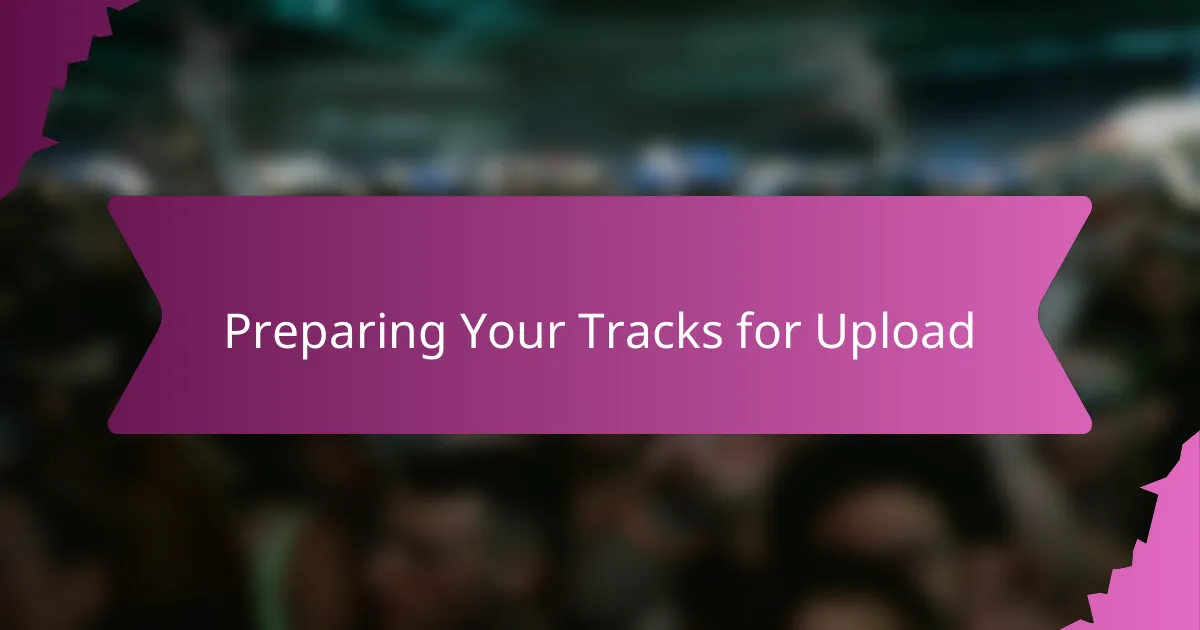
Preparing Your Tracks for Upload
Before I even hit upload, I made sure each track was polished and matched DistroKid’s format requirements. From my experience, having your audio files in the right quality—usually WAV or FLAC—is essential to avoid any glitches during the process. Have you ever had an upload fail because of file formats? It’s frustrating, but taking this small step upfront saves so much hassle later.
Naming your tracks clearly is something I can’t stress enough. I learned this the hard way after a messy project where files were labeled simply as “final” or “mix 2.” It’s tempting to skip this, but clear titles helped me stay organized and ensured my releases looked professional on streaming platforms.
Lastly, don’t underestimate the power of tagging your songs correctly. When I added genres, moods, and even language tags thoughtfully, I noticed my music reached the right audience quicker. It makes you wonder—how many potential listeners slip away just because metadata wasn’t precise? Getting this right feels like giving your tracks the best chance to be heard.
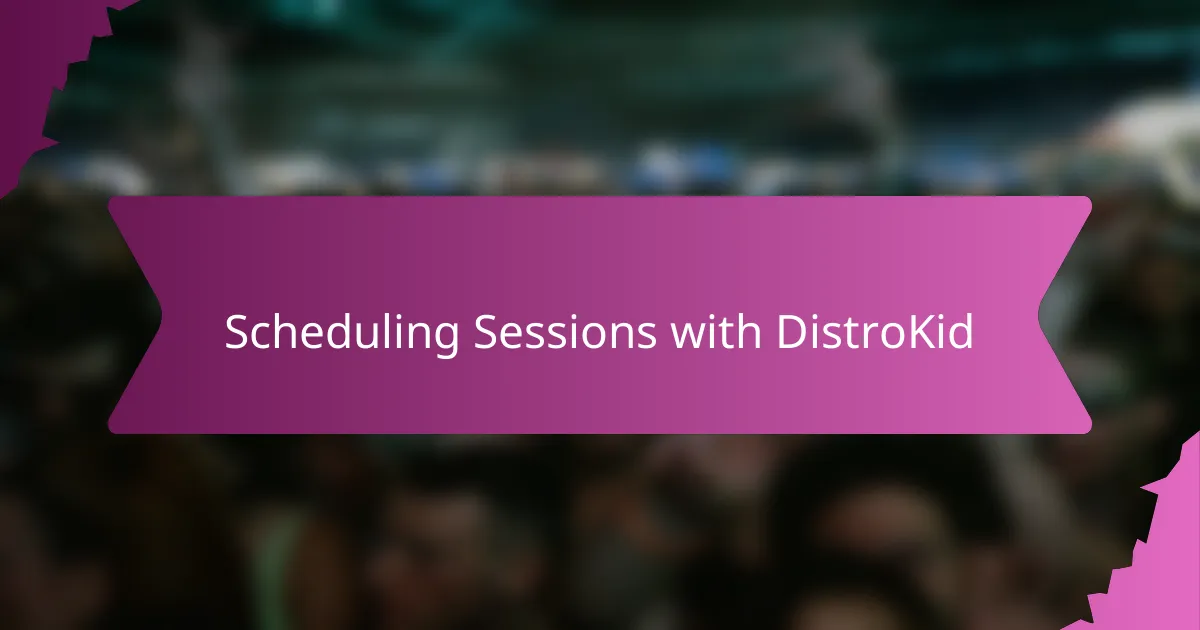
Scheduling Sessions with DistroKid
Scheduling sessions with DistroKid turned out to be surprisingly smooth for me. At first, I worried about having to navigate complex calendars or endless email threads, but the platform’s scheduling tools were refreshingly straightforward. Have you ever felt overwhelmed trying to book studio time or promotional slots? DistroKid’s approach made that stress almost disappear.
I found that setting specific release times was particularly helpful. By choosing the exact date and even the time zone, I could coordinate my launches with social media campaigns and even make sure my music dropped first thing on a Friday morning, which really seemed to boost initial plays. From my experience, this level of control feels empowering—like you’re not just pushing play but actually orchestrating the whole rollout.
What really impressed me was the ability to schedule multiple sessions ahead of time, which meant I could plan an entire series of releases without constantly logging in. This saved me so much time and allowed me to focus more on the creative side. Have you tried scheduling everything at once and then just letting the platform handle the rest? It’s a game-changer in managing your music career efficiently.
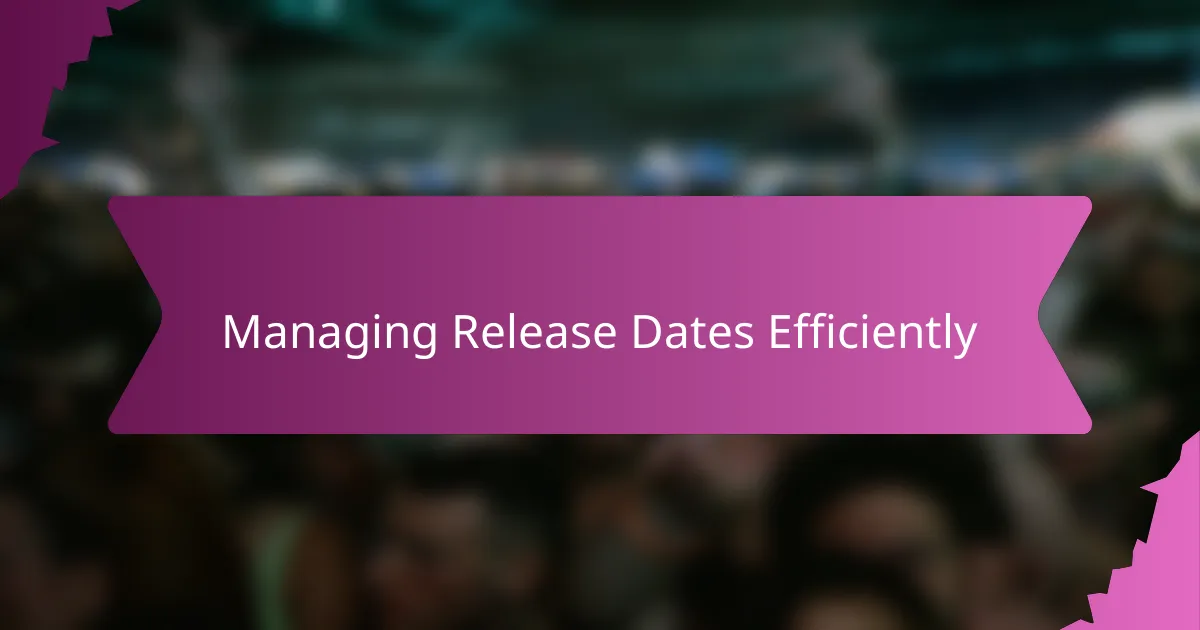
Managing Release Dates Efficiently
One key to managing release dates efficiently with DistroKid, from my experience, is treating scheduling like a strategic chess game. Have you ever launched a track on the fly only to realize you missed a sweet promotional window? When I started setting release dates weeks in advance, it completely changed the momentum of my music projects. That foresight gave me breathing room to build hype and align every piece of the puzzle.
I also learned to respect the platform’s buffers—upload your songs well before the planned drop date. Trust me, rushing last minute creates unnecessary stress and risks delays. DistroKid usually needs a few days to process releases, so I make it a habit to finalize everything early. It’s a simple discipline that saved me from a few heart-stopping moments wondering if my music would go live on time.
Finally, the option to sync release dates across different platforms was a revelation. Coordinating Spotify, Apple Music, and others manually felt chaotic before, but now I can ensure my fans get access everywhere simultaneously. Doesn’t that kind of seamless rollout feel like giving your music the grand entrance it deserves? For me, it turned releasing songs into a smooth, controlled experience rather than a scramble.
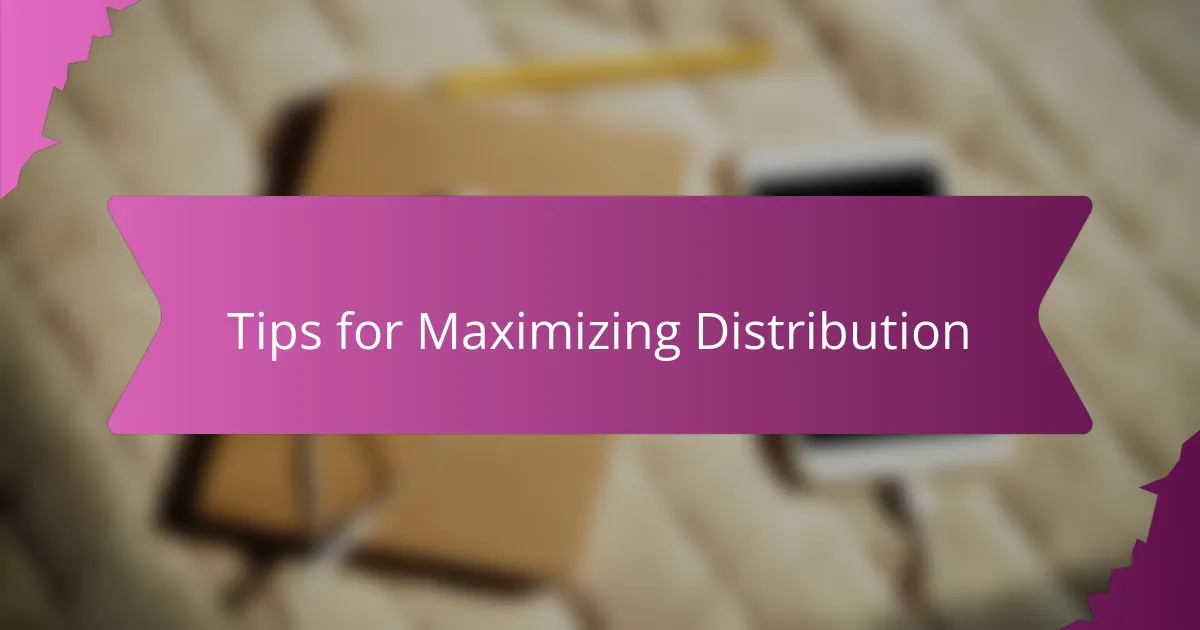
Tips for Maximizing Distribution
Maximizing distribution with DistroKid really comes down to being proactive with your release plans. I noticed that when I took advantage of the advanced scheduling features, my music didn’t just drop randomly—it felt like I was crafting an event. Have you ever released a song without a clear plan and wondered why it didn’t gain traction? That’s exactly why timing and coordination make all the difference.
Another tip I learned is to leverage DistroKid’s automatic platform syncing. It might sound simple, but ensuring your tracks go live simultaneously across Spotify, Apple Music, and others helped me capture the full buzz without tiring out my audience on one channel before the rest caught up. It’s like setting off fireworks everywhere at once rather than in a scattered, uncoordinated way.
Lastly, don’t forget about metadata optimization for distribution. I took extra time to fill every tag carefully—genres, moods, languages—which surprisingly increased the chances of playlists picking up my songs. When you think about it, how often do listeners discover music purely through search or algorithm recommendations? Making your music easy to find feels like giving yourself an invisible marketing boost.
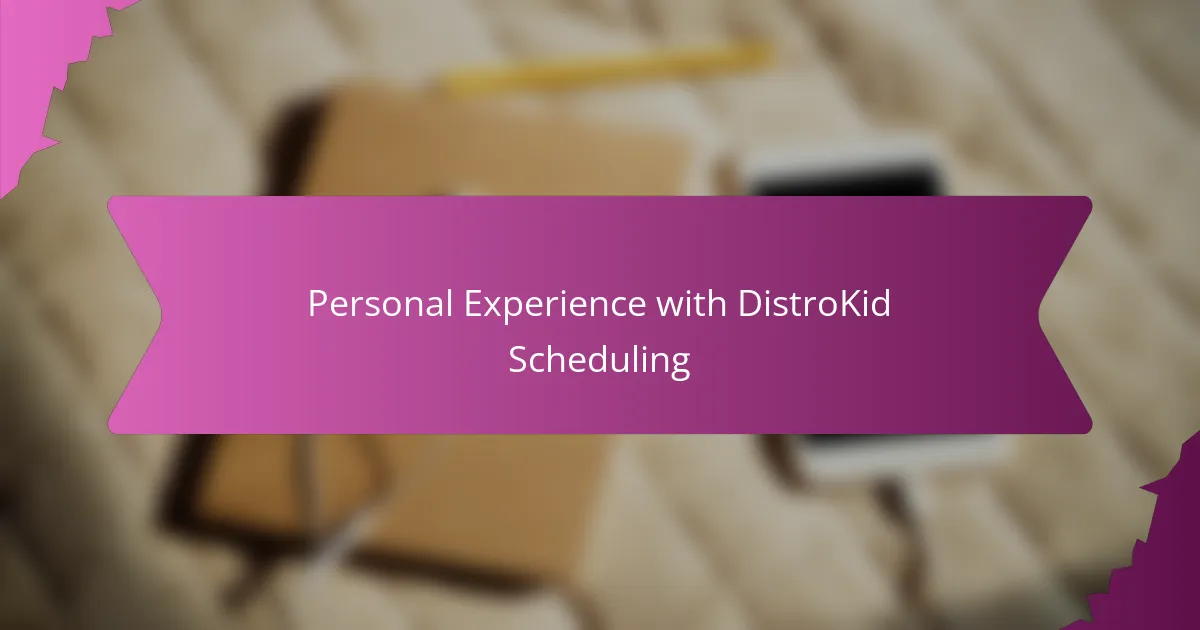
Personal Experience with DistroKid Scheduling
When I first used DistroKid’s scheduling feature, I was relieved by how intuitive it was. I expected a clunky system, but instead found myself setting release dates with ease, almost like planning a simple calendar event. Have you ever had that feeling where a tool just “gets” what you need? That’s exactly what happened here.
One moment that stood out was when I coordinated a release to drop exactly at midnight in my time zone. It felt like orchestrating a launch rather than just hitting “upload.” Knowing my fans would experience the song fresh and at the right moment gave me a little extra thrill and confidence in the process.
What really changed the game for me was being able to queue multiple sessions days or weeks ahead. It meant I could focus on creating new music without the constant stress of manually managing every release. Have you tried that kind of forward planning? For me, it turned scheduling from a chore into a smooth part of my workflow.